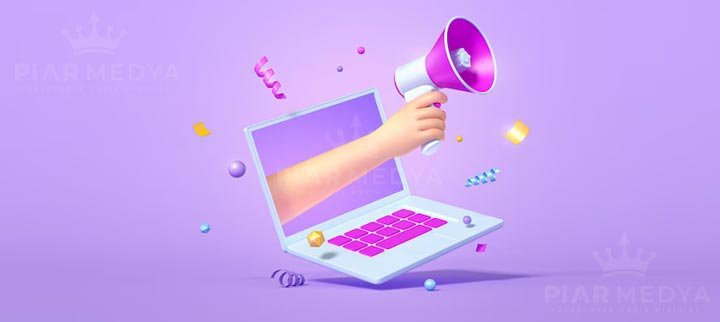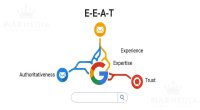What is Digital Marketing and What Does It Do?
Digital marketing is the promotion of products or services on digital channels. It aims to reach a broad audience and drive engagement. You will find answers to all your questions related to topic What is Digital Marketing and What Does It Do? in the continuation of the text.

What Are the Core Components (Channels) of Digital Marketing?
1. Search Engine Optimization (SEO)
2. Search Engine Marketing (SEM)
3. Content Marketing
4. Social Media Marketing (SMM)
5. Email Marketing
6. Influencer and Affiliate Marketing
Step-by-Step: How to Create a Digital Marketing Strategy?
Step 1: Define Goals and Key Performance Indicators (KPIs)
Step 2: Identify Target Audience and Create User Personas
Step 3: Competitor and Market Analysis
Step 4: Channel Selection and Budget Planning
Step 5: Produce Value-Oriented Content and Execute
Step 6: Monitor, Analyze, and Optimize
Differences Between Digital Marketing and Traditional Marketing
The Future of Digital Marketing: Trends for 2025 and Beyond
Professional Support: Why Should You Work with a Digital Marketing Agency?
Digital Marketing refers to all online activities carried out to promote, market, and sell a brand, product, or service to potential customers through digital channels such as search engines, websites, social media, email, and mobile applications. Its main goal is to build brand awareness, establish customer engagement, and achieve business objectives by reaching the right audience, at the right time, on the right platform.
Measurable and Data-Driven Results
Unlike traditional marketing, the biggest strength of digital marketing is that every step is measurable. It allows you to analyze, with clear data, the return on every penny spent (ROI), which channel is more effective, and customer behaviors. This enables strategies to be continuously optimized.
What Are the Core Components (Channels) of Digital Marketing?
A successful digital marketing strategy consists of multiple integrated disciplines rather than sticking to a single channel. Here are the main digital marketing channels and their functions:
1. Search Engine Optimization (SEO)
SEO refers to optimization efforts that ensure your website ranks higher in “free” (organic) search results on search engines like Google for specific keywords. The goal is to be the first brand potential customers encounter while actively searching for a solution.
- Technical SEO: Improving technical infrastructure such as site speed, mobile compatibility, and sitemap.
- On-Page SEO (Content SEO): Producing valuable, keyword-enriched content that answers users’ questions.
- Off-Page SEO: Increasing site authority by getting backlinks (reference links) from other trusted sites.
- For beginners, you can check this resource: Google's SEO Starter Guide
2. Search Engine Marketing (SEM)
SEM is gaining visibility by advertising on search engine results pages (SERP). The most well-known platform is Google Ads. While SEO targets organic and long-term results, SEM (usually with a Pay-Per-Click - PPC model) delivers instant results.
3. Content Marketing
Content marketing is a strategy of creating and distributing valuable content (blog posts, videos, e-books, infographics) that solves problems, educates, or informs your target audience, rather than trying to sell directly. This method is fundamental for building brand loyalty and trust and is an integral part of SEO.
4. Social Media Marketing (SMM)
Activities aimed at engaging with the target audience, creating brand awareness, and driving traffic via social media platforms like Instagram, Facebook, LinkedIn, TikTok, and X (Twitter). It includes both organic posts and paid social media advertising.
5. Email Marketing
A method of communicating directly with your existing or potential customers by sending personalized messages, campaigns, newsletters, or announcements to their email addresses, with their consent. It is one of the channels with the highest return on investment (ROI) for building customer loyalty and remarketing.
6. Influencer and Affiliate Marketing
- Influencer Marketing: Having influential individuals with a specific audience on social media promote your product or service.
- Affiliate Marketing: A performance-based model where other websites or individuals (affiliates) earn a commission for traffic or sales they direct to your product.

Step-by-Step: How to Create a Digital Marketing Strategy?
An effective strategy requires following a planned roadmap rather than taking random actions.
Step 1: Define Goals and Key Performance Indicators (KPIs)
What do you want to achieve? Simply saying “increase sales” is not enough. Your goals should be SMART (Specific, Measurable, Achievable, Relevant, Time-bound).
Example: “Increase our website’s organic traffic by 30% within the next 6 months” or “Increase sales from email marketing by 15% in Q3.”
Step 2: Identify Target Audience and Create User Personas
Who are you selling to? Create detailed “user personas” by analyzing demographics (age, gender, location), interests, challenges, and online behavior. All your marketing messages should address these personas.
Step 3: Competitor and Market Analysis
On which channels are your competitors strong? What kind of content do they produce? What messages do they use in their ads? This analysis helps you identify their weaknesses and the gaps (opportunities) you can fill. Tools like Ahrefs and SEMrush play a critical role at this stage.
Step 4: Channel Selection and Budget Planning
Which platforms does your target audience spend the most time on? Which channels (SEO, SEM, Social Media, etc.) make the most sense for achieving your goals? Plan how much budget to allocate to the selected channels.
Remember: You don’t have to be on every channel. It is more efficient to focus your resources on the channels that will deliver the highest return.
Step 5: Produce Value-Oriented Content and Execute
Create content that will attract the interest of your personas and solve their problems for the channels you choose. Plan blog posts, videos, social media posts, and create a content calendar to publish them regularly.
Step 6: Monitor, Analyze, and Optimize
Analysis and optimization are not the final step but a cyclical process. Continuously monitor the performance of your campaigns using Google Analytics, Google Search Console, and social media analytics tools. Determine which strategies work and which don’t, and continuously improve (optimize) your strategy based on data.
Differences Between Digital Marketing and Traditional Marketing
| Feature | Digital Marketing | Traditional Marketing |
|---|---|---|
| Channel | Search engines, social media, email, websites | Television, radio, newspaper, magazine, billboard |
| Interaction | Two-way and instant (comments, likes, messages) | One-way and passive (viewer/reader) |
| Targeting | Detailed (demographics, interests, behavior) and personal | Broad and general audience |
| Measurement | Accurate, instant, and detailed (clicks, conversions, ROI) | Difficult, estimated, and slow |
| Cost | Generally lower cost and flexible budget | Generally high initial cost and fixed |
| Flexibility | Campaigns can be stopped or changed instantly | Difficult to make changes once the campaign starts |
The Future of Digital Marketing: Trends for 2025 and Beyond
Digital marketing is constantly evolving. To succeed in the future, it is essential to adapt to these trends:
- Hyper-Personalization with Artificial Intelligence (AI): AI will analyze customer data to deliver personalized product recommendations, content, and ads to each user.
- Privacy-Focused Marketing: With the removal of third-party cookies, brands will focus on collecting and transparently using their own first-party data. Customer trust will be more important than anything.
- Video and Interactive Content: Short-form videos (Reels, Shorts, TikTok), live streams, and augmented reality (AR) experiences will remain central to user engagement.
- Voice Search and Zero-Click Searches: With the rise of smart assistants, optimization for conversational queries like “Where is the nearest café?” (Voice Search SEO) and zero-click results that directly provide answers will become more important.
- Community Building: Brands will invest more in creating platforms (Discord, private groups) that bring their customers together and create a sense of community around the brand.
Professional Support: Why Should You Work with a Digital Marketing Agency?
As you can see in the guide, digital marketing is a dynamic process that requires strategy, technical knowledge, creativity, and continuous analysis. Managing all these channels in-house can be challenging in terms of both time and resources, especially for small and medium-sized businesses. At this point, working with a professional digital marketing agency becomes not a cost but an investment in growth for your business.
The main advantages of working with an agency are as follows:
- Expertise and Experience: Agencies have a team specialized in their respective fields (SEO, Google Ads, social media, content creation, etc.). Thanks to their experience in different industries, they know what works and what doesn’t, and they act based on proven strategies rather than assumptions.
- Strategic Perspective: They look at your business from an external, objective point of view and create a holistic strategy. Instead of getting lost in daily operations, they see the big picture and ensure all channels work harmoniously together.
- Advanced Tools and Technologies: Professional SEO tools, ad optimization software, and analytics platforms are quite costly. Agencies already have access to these tools and use them efficiently on your behalf.
- Time and Resource Savings: By outsourcing marketing activities to an agency, you regain valuable time to focus on your core business. You also save the cost of establishing a full-time marketing department.
- Measurable and Transparent Reporting: A good agency regularly provides clear reports on what they have done, how much they have spent, and what results (traffic growth, leads, sales, etc.) they have achieved in return. This way, you can clearly see the return on your investment (ROI).
Digital Marketing Agency or SEO Agency?
If your marketing needs cover multiple channels (advertising, social media, email, SEO, etc.), a digital marketing agency that offers 360-degree services would be more suitable for you. However, if your primary and fundamental goal is to rise organically in search engines and achieve sustainable visibility, working with a specialized SEO agency might be a more appropriate strategy.
In Summary
Digital marketing is no longer an option but a necessity to compete and grow in the modern business world. It is the most effective way to reach your customers, build meaningful relationships, and, most importantly, see the return on your marketing investments with tangible data. By using the right strategies and channels, businesses of all sizes can take advantage of the endless opportunities offered by the digital world.
FREQUENTLY ASKED QUESTIONS (FAQs)
Digital marketing is the marketing activity carried out with methods that involve the use of the internet and digital technologies to introduce brands' products and services to target audiences, engage with them, and increase sales.
Yes, absolutely. With the advancement of technology and increased digitalization, digital marketing is gaining more importance. The widespread use of the internet and digital platforms is increasing the demand for digital marketing experts.
The first step in digital marketing is defining your target audience. Understanding whom you want to reach is the foundation of creating your strategy.
There are various online courses, certificate programs, and educational resources available to learn digital marketing. Various training options are available to specialize in areas such as SEO, social media, and email marketing.
Digital marketing can work in various industries. Companies, agencies, e-commerce platforms, and media organizations require digital marketing experts.
The fundamentals of digital marketing include SEO (search engine optimization), social media management, content creation, email marketing, and tracking analytical data.
To become a digital marketing expert, you can undergo relevant training, gain experience, and continuously follow industry developments.
A digital marketing consultant is an expert who guides companies or individuals on digital marketing strategies. They assist in selecting the right channels, content management, and advertising campaigns.
Anyone interested in becoming a digital marketing expert can specialize in this field by undergoing relevant training and gaining experience.
Digital marketing encompasses various areas such as SEO, social media management, content creation, email marketing, advertising campaigns, and tracking analytical data.
The subcategories of digital marketing include SEO, SEM (search engine marketing), content marketing, email marketing, social media marketing, influencer marketing, and affiliate marketing.
The advantages of digital marketing include broad audience reach, measurable results, lower costs, the opportunity to provide personalized content, and global reach potential.






